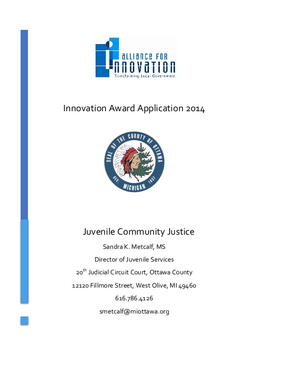
Juvenile residential treatment programs have always been a costly venture for juvenile courts and their funding units. Although sometimes necessary to use, residential treatment facilities costs range from $135 to $400 + per day, and often result in poor outcomes; thus, residential treatment programs are used by juvenile courts as “last resort” for youth who are considered to be a danger to public safety or not amenable to treatment in the community. They are also used because at times, it is easier to place a youth in a program outside the community than to treat within. Research clearly shows treating court-involved youth in the community is strongly preferred to residential placement because it allows the family to participate in the treatment process and doesn’t remove the youth from his/her community, thus retaining the youth’s positive connections and resulting in improved outcomes. Through a collaborative approach in the Juvenile Community Justice (JCJ) program, the court contracts with local lead, non-profit agencies to surround a youth with services based on their identified, unique needs.
